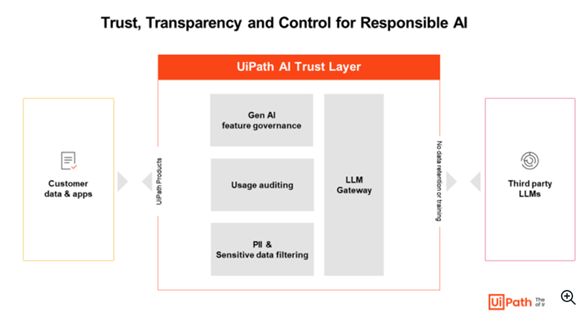From RPA to AI, agentic automation brings together the best of both worlds
By UiPath
The future of enterprise workflows would seamlessly combine the new automation areas opened by agentic AI, alongside the compliance, security and resilience provided by RPA, said UiPath’s Lim Khian Ghee.
-1751375683452.jpg)
The future of enterprise workflows would combine both probabilistic and deterministic technologies as it is applied to AI, said UiPath's Lim Khian Ghee. Image: Canva
Robotic process automation (RPA) has been a dominant force shaping the Singapore public sector by performing repetitive tasks at high speed, augmenting public officers through efficiency and productivity gains.
While RPA continues its strong presence, agentic artificial intelligence (AI) is also starting to make its mark in the public sector.
“While agentic AI is opening up new areas for automation, RPA remains critical for highly compliant, secure and resilient operations,” said UiPath Sales Director, Lim Khian Ghee.
UiPath, which is known for its enterprise automation and AI software, has made its move into agentic automation to merge RPA’s precision with AI’s adaptable intelligence – recognising its value for the public sector.
Lim pointed out that the future of enterprise workflows would combine both probabilistic and deterministic technologies as it is applied to AI.
By introducing AI agents into automation, these systems can adapt to varying contexts and make autonomous decisions, rather than following rigid scripts that are typical of RPA.
“The collaboration between humans, agents, and robots enables the execution of more complex workflows that go beyond the capabilities of standard RPA,” he shared, adding that this could enhance public agencies’ ability to tackle larger and more complex automation.
Ahead of the UiPath Agentic Automation Summit on July 8, Lim shared more about the value of agentic automation for public agencies, and how UiPath works with the public sector to ensure AI governance and competency.
To subscribe to the GovInsider bulletin, click here.
Agentic automation to partner, and not crowd out
Think of AI agents, RPA robots, and people working together symbiotically in an orchestrated process made possible by agentic automation.
To complete an end-to-end process, an AI agent can direct RPA robots to handle routine, rule-based tasks, while utilising robots with intelligent automation capabilities for document analysis or extracting information from various internal and external systems.
Meanwhile, people provide the goals for the agents, ensure governance, and step in when human judgment and review are required.
For public agencies, agentic automation opens opportunities to automate manual workflows that were previously out of reach for traditional RPA, such as tasks that were considered too unstructured or decision heavy.
In Singapore, public agencies are likely to use agentic automation for document processing, data analysis, and resource allocation.
"Agentic automation enables data-driven decision-making in areas like urban planning and healthcare, leading to better public services and citizen experiences,” Lim explained.
According to UiPath, AI agents in healthcare could significantly accelerate drug discovery, patient diagnosis, and treatment by analysing large datasets and running complex simulations to predict efficacy.
These datasets might include digitised medical images, individual patient histories, up-to-date scientific data, and more.
Building security and trust in AI agents
A significant concern for the public sector has been whether software-as-a-service (SaaS) platforms meet government security requirements, said Lim.

He shared that the Trust Layer and Context Grounding capabilities of the UiPath Platform™ for agentic automation ensure that the systems deliver responses tailored specifically to public agencies, without relying on generic or public cloud data.
The Trust Layer, for example, is a software-defined governance that allows public agencies to monitor AI usage for third-party models deployed on the UiPath Platform.
Lim also emphasised the need for a robust validation process and keeping a human-in-the-loop to control and manage AI-powered systems, while ensuring sound and reliable decisions.
The UiPath Platform has recently been overlaid with a Maestro orchestration layer, which builds key performance indices (KPI) monitoring and central oversight needed to allow public agencies to safely scale AI agents across systems and teams.
“This controlled agency model ensures that AI agents operate within clearly defined guardrails, leading to improved security, predictability, and performance,” he explained.
Future of work in the age of AI agents
Looking ahead, Lim envisioned a “more intuitive and intelligent future”, where public officers would interact with AI agents in natural, conversational English.
“In this future state, AI agents will respond with layman-friendly recommendations and suggestions based on the questions asked and trigger relevant pre-built automations when needed,” he elaborated.
As for how automation would evolve to support public service delivery, it would move from being a “task executor” to an “intelligent assistant-like companion” by supporting officers in their daily work and decision-making.
With these advancements, the public sector is set to deliver improved services to citizens around the clock, offering 24/7 service portals, chatbots, and "tell-us-once" systems that boost both accessibility and satisfaction, Lim said.
“By blending public servants’ empathy, judgment, and civic mission with the precision and efficiency of agentic automation, governments can transform service delivery, create new public value, and address complex societal challenges,” he added.
That said, the rise of agentic automation has created urgency for public servants to future-proof their careers by upskilling.
To empower public servants with agentic automation, UiPath recently introduced its Upskill to Agentic Automation program, a free community program that equips public servants with the skills to work with emerging agentic systems via self‑paced training, peer support, and expert guidance.
The upcoming Agentic Automation Summit on July 8 will provide an avenue for Singapore public officers to:
- Gain practical insights into how agentic automation could streamline services and improve citizen outcomes
- Deepen understanding into the scope and limitations of these new technologies
- Learn from real-world case studies and global experts who are already leveraging agentic automation
- Discover how to meaningfully apply agentic automation within your unique operational and regulatory context
Find out more & register for the UiPath Agentic Automation Summit on July 8 in Singapore.